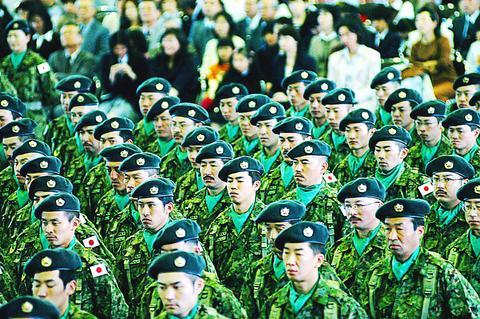Japan may extend its deployment of troops in southern Iraq if the security situation in the country does not change, a top government official said yesterday.
Chief Cabinet Secretary Hiroyuki Hosoda said, however, that the government has made no final decision yet.

PHOTO: EPA
"If the situation remains the way it is now, I think it's necessary for Japan to continue to get actively involved," said Hosoda. When asked if an extension was possible, Hosoda said, "Yes."
Some 500 Japanese troops on a non-combat, humanitarian mission in the Iraqi city of Samawah are slated to come home in December this year. Another 500 are based in neighboring Gulf states providing support.
The Nihon Keizai Shimbun reported yesterday that the Cabinet was expected to approve an extension of about one year before December, and that foreign ministry and defense officials have already notified Washington.
A Defense Agency spokeswoman declined to comment on the report.
The mission has faced strong opposition at home, where many fear the troops could get drawn into fighting in violation of Japan's pacifist constitution.
Critics have also charged that Japan's high-profile support of the US makes it an increasingly likely target of terrorism.
Hosoda said the government would keep a close watch on the terrorism problem and changes involving the new government in Iraq in making its final decision.
"We will to decide after evaluating the overall situation, including Iraq's reconstruction and security situation," he said.
NHK public broadcaster reported that Iraqi Prime Minister Ayad Allawi asked Prime Minister Junichiro Koizumi to keep Japanese troops in Iraq, when the two leaders met in New York on the sidelines of the UN General Assembly session.
Koizumi, emphasizing the need for stability in Iraq, responded that Japan intended to continue doing its utmost for the country's reconstruction, NHK said.

A fire caused by a burst gas pipe yesterday spread to several homes and sent a fireball soaring into the sky outside Malaysia’s largest city, injuring more than 100 people. The towering inferno near a gas station in Putra Heights outside Kuala Lumpur was visible for kilometers and lasted for several hours. It happened during a public holiday as Muslims, who are the majority in Malaysia, celebrate the second day of Eid al-Fitr. National oil company Petronas said the fire started at one of its gas pipelines at 8:10am and the affected pipeline was later isolated. Disaster management officials said shutting the

US Vice President J.D. Vance on Friday accused Denmark of not having done enough to protect Greenland, when he visited the strategically placed and resource-rich Danish territory coveted by US President Donald Trump. Vance made his comment during a trip to the Pituffik Space Base in northwestern Greenland, a visit viewed by Copenhagen and Nuuk as a provocation. “Our message to Denmark is very simple: You have not done a good job by the people of Greenland,” Vance told a news conference. “You have under-invested in the people of Greenland, and you have under-invested in the security architecture of this

Japan unveiled a plan on Thursday to evacuate around 120,000 residents and tourists from its southern islets near Taiwan within six days in the event of an “emergency”. The plan was put together as “the security situation surrounding our nation grows severe” and with an “emergency” in mind, the government’s crisis management office said. Exactly what that emergency might be was left unspecified in the plan but it envisages the evacuation of around 120,000 people in five Japanese islets close to Taiwan. China claims Taiwan as part of its territory and has stepped up military pressure in recent years, including

UNREST: The authorities in Turkey arrested 13 Turkish journalists in five days, deported a BBC correspondent and on Thursday arrested a reporter from Sweden Waving flags and chanting slogans, many hundreds of thousands of anti-government demonstrators on Saturday rallied in Istanbul, Turkey, in defence of democracy after the arrest of Istanbul Mayor Ekrem Imamoglu which sparked Turkey’s worst street unrest in more than a decade. Under a cloudless blue sky, vast crowds gathered in Maltepe on the Asian side of Turkey’s biggest city on the eve of the Eid al-Fitr celebration which started yesterday, marking the end of Ramadan. Ozgur Ozel, chairman of the main opposition Republican People’s Party (CHP), which organized the rally, said there were 2.2 million people in the crowd, but